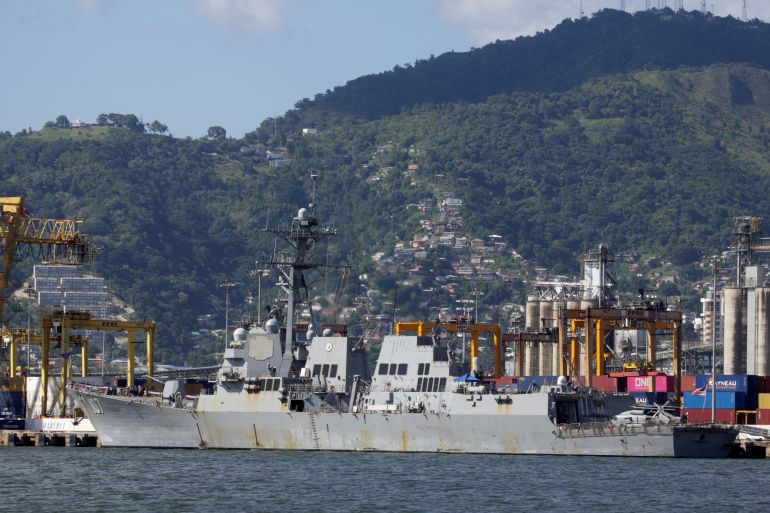Venezuela suspends Trinidad and Tobago gas accord over US warship visit
Caracas asserts that US actions in the Caribbean are a military threat and are meant to steal its oil and gas wealth.

By Lyndal Rowlands and News Agencies
Published On 28 Oct 202528 Oct 2025
Save
Venezuela has suspended a major gas deal with neighbouring Trinidad and Tobago, citing the island nation’s reception of a United States warship.
President Nicolas Maduro ordered the “immediate suspension” of a deal to provide natural gas to Trinidad and Tobago, state broadcaster TeleSUR reported on Monday.
Recommended Stories
list of 4 itemsend of list
The island is hosting one of several US warships deployed near Venezuelan waters by President Donald Trump’s administration. Venezuelan officials have accused the US president of seeking regime change.
Cancelling the gas deal, Maduro accused Trinidad and Tobago Prime Minister Kamla Persad-Bissessar of transforming the Caribbean nation “into an aircraft carrier of the American empire against Venezuela”.
Trinidad and Tobago “ran out” of gas before Venezuela had agreed to help it with the deal, Maduro asserted.
Persad-Bissessar pushed back, telling Trinidad and Tobago’s Newsday newspaper that the country’s future “does not depend on Venezuela and never has”.
She added that her government has been moving away from reliance on the long-delayed joint Dragon gasfield, which sits in Venezuelan waters near Trinidad.
“The last … government mistakenly placed all their hopes in the Dragon project. We have not done so,” Persad-Bissessar said.
This means that the government is “not susceptible to any blackmail from the Venezuelans for political support,” she asserted.
However, she denied that there are rising tensions between the two countries, which are separated by a small bay just 11km (7 miles) wide at its narrowest point.
Advertisement
‘Illegal and immoral military threat’
The USS Gravely, a guided-missile destroyer, arrived on Sunday in the Trinidadian capital, Port of Spain, with US Marines on board before planned joint military exercises.
Venezuelan authorities described Trinidad’s decision to host the ship as a provocation. The island nation’s government has stressed that joint exercises with the US happen regularly.
Since September, the Trump administration has launched 10 strikes against vessels in the region that it alleges were carrying drugs, killing at least 43 people.
The Pentagon has so far deployed seven warships, a submarine, drones and fighter jets to the Caribbean as well as another warship to the Gulf of Mexico.
The US has also announced the imminent arrival of the USS Gerald R Ford, the world’s largest aircraft carrier, which can host up to 90 airplanes and attack helicopters.
Many Latin America and Caribbean leaders have compared the strikes to extrajudicial killings. However, Persad-Bissessar has supported the US campaign, saying she’d rather see drug traffickers “blown to pieces” than have them kill citizens of her nation.
Venezuela argues that the attacks are aimed at allowing “external powers to rob Venezuela’s immeasurable oil and gas wealth”.
Foreign Minister Yvan Gil Pinto told the United Nations General Assembly on Monday that the US has an “illegal and completely immoral military threat hanging over our heads”.
Several senior officials have accused the US of using false claims of a war against drugs to prepare a bid to oust Maduro’s government, which earned international opprobrium last year as it won elections branded neither free nor fair.
Dragon and Manatee gas projects
Venezuela and Trinidad and Tobago first agreed to jointly drill for gas in 2018. However, the project has been long delayed and complicated by US sanctions on Venezuela.
US Secretary of State Marco Rubio said last month that the US supports the Trinidad government’s Dragon gas proposal but it would take steps to ensure it will not provide significant benefit to Maduro’s government.
The licence on the field permits the British multinational oil and gas company Shell and Trinidad’s National Gas Company to develop the Dragon gasfield off Venezuela despite the sanctions targeting Maduro’s government.
Shell is separately developing the Manatee gas project, which crosses the maritime border into Venezuela but has received permission from the Maduro government to be developed on the Trinidad side independently. It was not immediately clear whether that project could also be at risk, the Reuters news agency reported.
Advertisement
The Dragon gasfield is reported to have 119 billion cubic metres (4.2 trillion cubic feet) of gas, a fossil fuel that contributes to climate change.
The International Energy Agency warned in 2021 that launching new oil and gas projects was incompatible with reaching climate targets set out in the Paris Agreement.
Trinidad and Tobago is reliant on gas for 92.6 percent of its energy needs with the remaining 7.3 percent provided by oil products, according to the International Energy Agency (IEA).
Renewable energy sources, such as wind and solar, provide 0.02 percent of the island nation’s energy, according to the IEA, well below other countries in the region.

